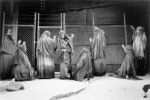Trojan women is Greek to us

November 21, 2002
Villanova Theatre’s production of “The Trojan Women” is quite the experience for anyone who attends. I’ve never seen anything quite like it, and I doubt I ever will again. Despite strong acting, the talent is stifled by its absurdity. The story, originally written by Euripides in 415 B.C. and translated by Nicholas Rudall, is directed by 2001 Barrymore Award-winning director James J. Christy, who has directed five other Greek plays at Villanova.
“The Trojan Women” takes place immediately after the fall of Troy and focuses mainly on the old Trojan queen Hecuba (Antoinette “Toni” Purnell) and her children. The play revolves around the sufferings of the wives and children of the city’s defeated leaders. Each awaits an uncertain fate chosen for her by the Greeks who have conquered the ruined city. Hecuba’s daughter, Cassandra (Kristyn Chouiniere), is taken as Agamemnon’s concubine, while her daughter-in-law, Andromache (Nina Donze), is fated to be the slave and mistress of Neoptolemus. Her son, Astyanax (Dimitri Lewicki and Jacob VanLangeveld), is sentenced to death. Throughout “The Trojan Women,” personal war testimonies are used from women living in the war-afflicted countries of Africa, Afghanistan, Kosovo, Ireland and Thailand.
Poseidon opens the play by summarizing the past events that have led up to the present state of the women. Masked and clothed in an impressive costume, the audience does not even recognize that Rev. Peter M. Donahue, O.S.A., portrays the god of the sea until the end of the production.
The tone of the play is very serious, but it is almost impossible for us to connect with the characters because of its ridiculous nature. For instance, the set is impressive, but the metal fence used to cage the women seems obviously anachronistic. Half of the characters are dressed in proper attire for the time, while the other half dons modern-day garb. The women of Troy wear traditional gowns and cloaks, while the uniforms of the Greek soldiers look like they are on loan from ROTC. They are covered in camouflage from head to toe, carry military assault rifles and stomp around in black leather boots.
Let the confusion begin.
Talthybus, a Greek herald (Carl Granieri) rattles off the fates of Hecuba and her children. Andromache and her son Astyanax join the women in their holding camp, with Astyanax sporting present-day fashion.
The most serious point in the play occurs when Talthybus regretfully informs Andromache that her son is to be put to death, but it is hard for the audience to connect with her pain when Astyanax is running around in Adidas sneakers, jeans and a sweatshirt. Alas, the play continues when Menelaus, King of Sparta and husband of Helen (Mike Kleba), pays a visit to the Trojan women. He comes strolling into the camp in a professional business suit and hardhat, speaking in a southern accent. I wasn’t sure if I was watching the King of Sparta or Bill Clinton. Shortly after his arrival, his wife Helen (Daniella Vinitski), is dragged into the holding camp by soldiers. She looks like a disgruntled prom queen circa 1983 in her sequined evening gown, red pumps and tiara.
The play ends with each of the women being sent to her future owner, and Hecuba tearfully picking up Astyanax’s bloody Adidas sneaker. Tragic.
The absurdity of the play is almost too hard to accept. While sitting in the audience, I desperately wished they would stop every 15 minutes for a question and answer session. Despite its strong acting, the message being conveyed in ‘The Trojan Women” is impossible to understand. In the end, all you can remember is how ridiculous it is, and nothing else.
“The Trojan Women” runs through Sunday in Vasey Hall. Tickets can be purchased at the Villanova Theatre Box Office or by calling x9-7475.

